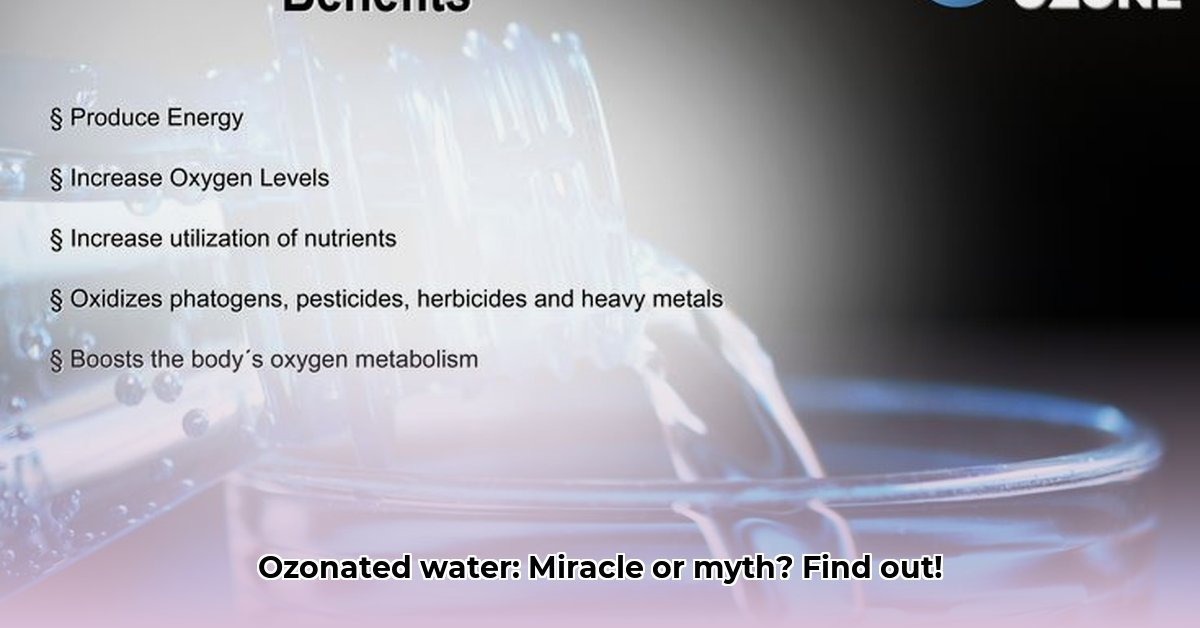
Benefits of Ozonated Water: A Closer Look
Ozonated water, water infused with ozone gas, has generated considerable interest for its purported health benefits. However, separating fact from fiction requires a careful review of the available scientific evidence. While some studies suggest potential advantages, significant gaps remain, and many claims lack robust support. This review aims to provide a balanced perspective, highlighting both potential benefits and safety concerns.
Many wonder if ozonated water truly lives up to its purported benefits. It's crucial to approach this topic with scientific rigor, separating substantiated claims from unsubstantiated hype.
Is Ozonated Water a Germ-Fighting Superhero?
Laboratory studies indicate ozonated water possesses antimicrobial properties, exhibiting effectiveness against various bacteria, viruses, and fungi in vitro (in a controlled laboratory setting). This suggests potential applications in food safety and wound care. However, translating these promising lab results into real-world effectiveness remains a significant challenge. The complexities of the human body and varied environmental factors mean that controlled laboratory settings often do not accurately reflect real-world effectiveness. More research is needed to determine the practical efficacy of ozonated water in diverse real-world applications.
Could This Help My Teeth?
Preliminary research suggests a possible link between ozonated water mouthwash and reduced levels of Mutans Streptococci, bacteria associated with tooth decay. However, these studies are small and require replication with larger sample sizes before any definitive conclusions can be drawn. The evidence currently available is insufficient to support widespread claims of ozonated water's effectiveness for oral hygiene.
Sorting Fact from Fiction: What Ozonated Water Probably Can't Do
Numerous unsubstantiated claims surround ozonated water. Several require further evaluation for clarity and accuracy:
- Cancer Treatment: While some preclinical (animal) studies hinted at potential synergy with chemotherapy, these findings have not translated into successful human clinical trials. Extrapolating results from animal studies to human applications often proves unreliable.
- Detoxification Powerhouse?: Claims portraying ozonated water as a potent detoxification agent lack robust scientific evidence. The human body possesses efficient natural detoxification mechanisms. Claims of significant detoxification enhancement by ozonated water are unsubstantiated.
- Hydration and Energy Boost?: The hypothesis that ozonated water improves cellular oxygenation, leading to enhanced hydration and energy, currently lacks supportive clinical evidence. Further research is needed to verify these claims.
- Antioxidant Abilities?: Ozone's chemical properties suggest potential antioxidant effects. However, consistent demonstration of such effects in humans consuming ozonated water remains elusive. Studies are needed to establish whether ozonated water provides significant antioxidant benefits in humans.
Safety First: Potential Risks
While ingesting ozonated water is generally considered safer than inhaling ozone gas (which is highly dangerous), potential risks exist. Individuals with respiratory conditions or pregnant women should exercise particular caution. Moreover, long-term effects of regular ozonated water consumption remain largely unknown, highlighting the need for further investigation. More research into long-term effects is needed before conclusive statements can be made on the safety of regular ozonated water consumption.
The Big Picture: What We Don't Know (Yet)
A significant obstacle in ozonated water research stems from the inconsistent ozone concentrations employed across different studies. This variability hinders direct comparison of results and necessitates standardized protocols for future investigations. The lack of standardization creates uncertainties surrounding the efficacy of ozonated water.
A Summary of the Current Research Landscape
| Area of Application | Evidence Level | Summary |
|---|---|---|
| Antimicrobial Effects | Moderate | Shows promise in vitro; limited real-world data; needs larger human studies. |
| Oral Health | Limited | Suggestive but inconclusive; needs larger, well-designed clinical trials. |
| Cancer Treatment | Very Limited | No conclusive human data; preclinical studies warrant further investigation. |
| Detoxification/Energy/Hydration | Very Weak | Largely unsubstantiated; requires strong empirical evidence. |
Disclaimer: This information is for educational purposes only and does not constitute medical advice. Consult a healthcare professional before using ozonated water.
How to Safely Use Ozonated Water for Wound Healing (If At All)
Key Takeaways:
- Limited evidence suggests potential benefits in wound healing, but more research is needed.
- Proper preparation and application are crucial for both efficacy and safety.
- There is no conclusive evidence that ozonated water is superior to standard wound care.
- Safety is paramount; improper use can lead to negative consequences.
- The regulatory landscape for ozonated water in wound care is still developing.
Understanding Ozonated Water's Potential Role in Wound Healing
Ozonated water's antimicrobial properties may contribute to faster wound healing by reducing bacterial load, and increase oxygen levels in the wound, potentially promoting tissue repair. However, the evidence supporting these claims is not conclusive and requires further investigation.
The Science—and the Gaps
While animal studies and some small human trials show positive results, large-scale, well-designed clinical trials comparing ozonated water to standard wound care treatments are lacking. This makes it difficult to confidently assess its efficacy and safety relative to established methods.
Weighing the Risks
Potential risks associated with the use of ozonated water for wound healing include skin irritation, allergic reactions, and potential for delayed healing if used improperly. Always weigh the potential benefits against these risks before applying it as a treatment method.